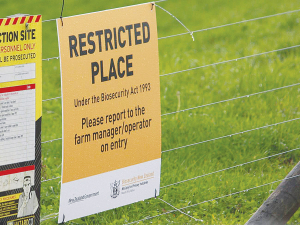We must keep our foot on the pedal
OPINION: Last week marked a major step forward in our work to eradicate Mycoplasma bovis.
 Bulk tank milk (BTM) screening results this spring – 34,853 samples tested from July 1 to September 27 – found 88 ‘detects’ so far.
Bulk tank milk (BTM) screening results this spring – 34,853 samples tested from July 1 to September 27 – found 88 ‘detects’ so far.
New Zealand's world-first Mycoplasma bovis eradication programme is making great strides but this isn't the time for complacency, says Ospri.
Bulk tank milk (BTM) screening results this spring - 34,853 samples tested from July 1 to September 27 - found 88 'detects' so far. After on-farm sampling and investigation, there have been no new confirmed cases.
Ospri told Rural News that all the indicators - from BTM screening to beef herd surveillance - gives it confidence that its 10-year programme is working.
"While there are no confirmed M. bovis cases today, we can't assume we've found all infection yet.
"Complacency now will put at risk the huge eradication effort we've all contributed to so far."
To confidently claim eradication, Ospri needs a large volume of samples over multiple years to achieve this. The programme is currently in the 'delimiting' phase.
"This means we continue to check for infection and gather data. Our national surveillance, through livestock and BTM testing, remains an important tool."
The M. bovis eradication programme started in 2018 and is expected to take 10 years. To date, 282 confirmed properties have been destocked. Almost 190,000 cattle have been culled and nearly 3000 claims have been processed. Farmers have been compensated to the tune of $290m for financial losses incurred because of programme activities. The programme has cost over $700m to date.
Ospri points out that the eradication was estimated to cost $870 million in 2018.
By comparison, it was estimated the cost of letting M. bovis spread would have been $1.3 billion in lost productivity in the first 10 years alone.
It says the programme will need ongoing funding. DairyNZ, Beef + Lamb NZ and the Government, through the Ministry for Primary Industries, provide funding.
"New Zealand's world first M. bovis eradication programme has made great strides towards being able to declare the country free from the disease," Ospri says.
"However, with a few years of work remaining, the programme will need ongoing funding - including farmer levies. Earlier this year, programme partners decreased levies significantly, and levies will continue to adjust in relation to the needs of the programme."
BMT screening will continue to play a key role in the programme. In spring, detect results rise.
"We know that our screening test has increased sensitivity during early lactation, therefore, we have an increased chance of detecting possible infection in spring," Ospri says.
"The start of the milking season is our best time to capture infection risk from milking herds returning from winter grazing and heifers entering the milking platform for the first time. Most of the confirmed properties found by BTM surveillance have been identified during the spring period.
"To confidently claim eradication, Ospri points out that it will need a large volume of samples over multiple years to achieve this," it says.
"The programme is currently in the 'delimiting' phase. This means we continue to check for infection and gather data. Our national surveillance, through livestock and BTM testing, remains an important tool."
Ospri acknowledges the impact BTM screening has on farmers and their operations.
"In the years to come, we're confident that the impact to farmers will reduce. But right now, it's too soon to say specifically what work or restrictions will decrease. We need to carefully balance the potential disruption of our work, against the risk of missing any underlying disease in the national herd."
The Meat Industry Association of New Zealand (MIA) today announced that Chief Executive Officer Sirma Karapeeva has resigned from the role.
The winners of the 2026 Hawke’s Bay/Wairarapa Dairy Industry Awards were announced at the annual awards dinner held at Copthorne Solway Park in Masterton on Thursday evening.
Environment Southland is welcoming this week’s decision by the Environmental Protection Authority (EPA) to approve the release of Blaptea elguetai, a leaf‑feeding beetle that will help control the highly invasive Chilean flame creeper.
This March, the potato industry is proudly celebrating International Women’s Day on 8 March alongside the International Year of the Woman Farmer, recognising the vital role women play across every part of the sector — from paddocks and packhouses to research, leadership, and innovation.
Fruit trader Seeka posted a record profit and returns to shareholders in 2025.
Recent weather events in the Bay of Plenty, Gisborne/Tairawhiti, and Canterbury have been declared a medium-scale adverse event.